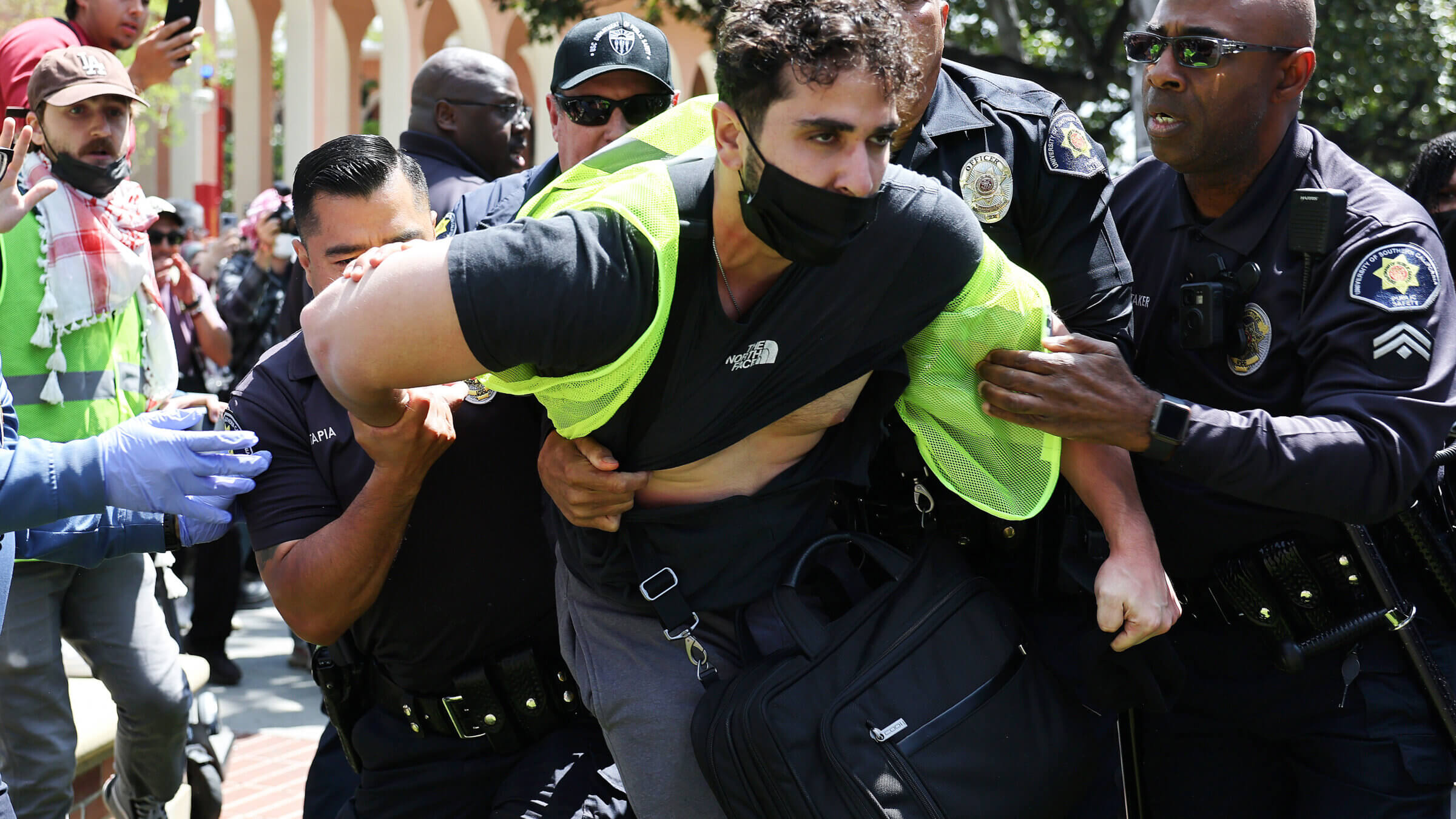USC cancels graduation amid tumult over Israel and Gaza
The decision was announced a day after police arrested protesters at the Los Angeles campus and at at several other campuses across the nation

USC public safety officers detain a pro-Palestine demonstrator during clashes after officers attempted to take down an encampment in support of Gaza at the University of Southern California on April 24, 2024 Photo by Mario Tama/Getty Images
The University of Southern California has canceled its primary May graduation ceremony after a tumultuous several days of protest and arrests that began with the university’s decision to cancel a speech by the valedictorian, a Muslim American whose social posts on Israel prompted widespread condemnation from Jewish groups.
The university’s statement Thursday said the decision to cancel commencement was made for safety reasons. It comes less than a day after police arrested 93 protesters on campus for trespassing, and in the case of one protester, assault with a deadly weapon.
“We understand that this is disappointing; however, we are adding many new activities and celebrations to make this commencement academically meaningful, memorable, and uniquely USC, including places to gather with family, friends, faculty, and staff, the celebratory releasing of the doves, and performances by the Trojan Marching Band,” USC said in a statement.
The university’s decision was announced as pro-Palestinian protests on campus, and the arrest of student and faculty demonstrators, escalated across the nation. Students set up “Gaza Solidarity Encampments” at Cornell University, Yale University, George Washington University, Emory University, the University of North Carolina at Chapel Hill and the University of Texas at Austin, among other schools.
Since Wednesday police have arrested protesters at— in addition to USC — Emerson College, Princeton University, Emory and the University of Texas at Austin, where at least 57 were arrested. More than 500 students there had staged a walkout demanding that the state’s flagship public university divest from Israeli weapons manufacturers.
The protests have become a canvas for politicians of all stripes, who have made appearances on campuses to advance their own agendas. Republican politicians, including House Speaker Mike Johnson at Columbia Wednesday, have urged drastic interventions to quell what they describe as antisemitic unrest. Some progressive Democrats, including Reps. Ilhan Omar and Rashida Tlaib, appeared in protest encampments. Omar’s daughter was suspended from Barnard College last week over her participation in protests.
“We are part of a historic moment in student movements drawing on anti-war student movements in American history,” Emanuelle Sippy, a Princeton junior, told The Daily Princetonian. “It’s very easy to valorize this when it’s about South African apartheid or the Vietnam War or Kent State. We need to show up in this present moment.” Sippy, president of a Princeton group called the Alliance of Jewish Progressives, said she was speaking only for herself.
Protests against Israel’s military campaign in Gaza began shortly after Oct. 7, when Hamas attacked Israel, killing 1,200 and kidnapping 240, dozens of whom are still in captivity. Hamas’ health ministry says Israel has killed more than 34,000 in Gaza, but does not distinguish combatants from noncombatants.
The current wave of protests began last Wednesday, when students at Columbia erected an encampment in the hours before the university’s president, Nemat Shafik, testified before a congressional committee on her campus’ response to rising antisemitism since Oct. 7. The next day, the university called New York City police to campus, who arrested more than 100 students, charging most with trespassing.
The university cleared the encampment, but students replaced it with a larger one, sparking a national movement in which protesters say they will not dismantle their tents until their schools divest from businesses that work with Israel’s military. Columbia still expects to host tens of thousands of guests at its graduation on May 15.
Many lambasted USC’s decision on social media, with some calling it a wrongheaded response to students expressing their views on Israel’s military campaign in Gaza. Others expressed sympathy for the class of 2024, which also missed its high school graduation, because of the COVID-19 pandemic.
The same graduating seniors who had their high school graduation canceled in 2020 because of the pandemic now can’t have a traditional university graduation, and for what??? Unbelievable cruelty from USC. https://t.co/g1oSEF3hvP
— Patrick DuChêne (@patrickduchene_) April 25, 2024
But Rabbi Dov Wagner, who directs Chabad at USC, said the protesters had forced the university’s hand. On Wednesday during the protests, “I would say the first time that Jewish students really were afraid,” he said. “At this point, there’s no question that USC has to take drastic measures in order to make campus a safe place for everybody.”
Louis Keene and JTA contributed to this report.
A message from our CEO & publisher Rachel Fishman Feddersen
I hope you appreciated this article. Before you go, I’d like to ask you to please support the Forward’s award-winning, nonprofit journalism during this critical time.
We’ve set a goal to raise $260,000 by December 31. That’s an ambitious goal, but one that will give us the resources we need to invest in the high quality news, opinion, analysis and cultural coverage that isn’t available anywhere else.
If you feel inspired to make an impact, now is the time to give something back. Join us as a member at your most generous level.
— Rachel Fishman Feddersen, Publisher and CEO